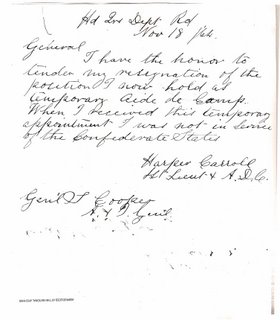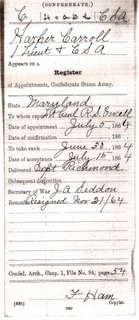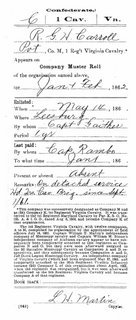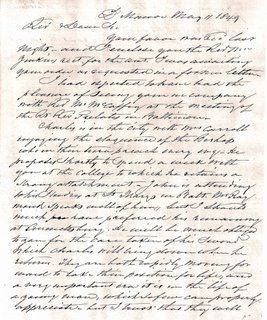Lee Family Papers
I discovered these in the Frederick County Historical Society and believe them to be copies of letters found in the Maryland Historical Society, but have not yet been able to confirm this. They are written to or by the Lee family of Needwood, near Frederick, Maryland. Most interesting from the point of view of the Harper Carroll project is the April 18, 1865 letter about the assassination of Lincoln, and the September 16, 1865 letter from Mary Letterman to her brother Thomas Sim Lee mentioning Harper Carroll had been made a widower.
___________________________________________________________________
Historical Context: Though not yet the great hero he was to become in the Mexican-American War, Winfield Scott was well-enough thought of in military circles to be made general-in-chief of the American army in 1841. This letter makes clear he and Lee had a personal friendship, one that may have been formed during John Lee’s military career. Scott’s daughter, Marcella, married into the Carroll-Lee clan when she married Charles Carroll McTavish, great-grandson of Charles Carroll of Carrollton. Whist is a card game played between two sets of partners that was popular in the 18th and 19th century.
General Winfield Scott to John Lee at Needwood, January, 1840
“I arranged to call this morning, but only got away from the War Office and ½ past 3. I have called to ask you up, with the hope of a good game of whist. Join us as soon as you may.”
____________________________________________________________________
Historical Context: Henry Clay of Kentucky was selected by the Whigs to be their presidential candidate in 1844. Clay had long advocated the Whig agenda of internal improvements and a protective tariff for America’s fledgling industries. Despite Lee’s assurance of Maryland’s support, Maryland’s vote went against Clay. Democrat James K. Polk won a narrow victory, having attracted critical votes in New York for his expansionist policies, particularly his desire to annex Texas. Though he ran for the presidency five times, Clay’s political ambitions in that regard were never realized, despite a distinguished record of leadership in both the House of Representatives and the Senate. The Governor Seward to whom Lee refers was William Seward, who had served two terms as the Whig governor of New York from 1838-1842. With the decline of the Whig party, Seward joined the new Republican Party. He would later become Lincoln’s Secretary of State and issue many of the orders for the arrest of pro-South Marylanders. The Native American party was the Know-Nothing Party, an anti-immigrant organization that sprung up out of fears that American cities were being overwhelmed by Irish Catholics.
John Lee at Needwood to Henry Clay, Ashland, Kentucky October 21, 1844
“In my return home yesterday from Baltimore, where business called me for a day, I had the pleasure to find your letter of the 13th inst. With its enclosure—I return today to Baltimore and shall proceed immediately on to New York—It is probably that I may meet with Govr. Seward in the city, as there is to be a great political gathering on the 23d inst. To which the Whigs of the Union are invited--& I learn will attend in great numbers—If he should not be there, I shall ascertain his locality that I may at the earliest moment have a personal interview with him—In the course of my journey, if any thing of interest occurs, I will write to you—
In Baltimore on the 18th I saw Genl. Scott, that evening from Washington—He stated that he had been told in the course of the day at Washington by a distinguished Democrat that the Democratic Party in Massachusetts, Vermont and New York, &c would withdraw their Electoral ticket & support the Abolition ticket, in the event of their ascertaining that the Native American Party in New York had decided to vote for the Whig Electoral ticket—that a mutual agreement between the Whigs & Natives would justify a coalition between the democrats & Abolitionists--& that the consummation of such an arrangement was intended to defeat an election by the people, & devolve the choice of the President on the House of Representatives,--He appeared to think that this project was the latest suggestion among the leaders in Washington—
I communicate this statement,--although I deem the project impracticable;--as well from a want of time to perfect the plan, as from its open account of abandoning all principle and decency—
The intelligence from Virginia is highly encouraging,--& our friends are being sanguine in Pennsylvania—In this Sate I think there can be no reasonable doubt of the result—It is conceded by all that your vote will greatly exceed that given for Governor—We do not relax our efforts & the party is well organized throughout the State—
You have heard, I suppose, that Barrow has a bet of $5000—with Proffit on the general result.
With my best regards to Mrs. Clay
_______________________________________________________________
Historical Context: In 1848, Zachary Taylor won the Whig nomination for president, despite Lee’s efforts to secure the nomination for Clay. Taylor, a hero of the Mexican War, was elected president and died soon after, leaving Millard Fillmore to inherit the presidency. During the short time he was in office, Taylor virtually repudiated the Whig economic program of internal improvements and a high tariff.
John Lee at Needwood to Henry Clay in Lexington, Kentucky, May 15, 1848
“You will have seen by the proceedings of our Whig State Convention that we adopted a resolution, offered reluctantly by a decided Taylor delegate, declaring that you were the first choice of the Whigs of Maryland, & Gen. Taylor their second choice.
I demanded that the sense of the Convention should be taken separately on the two branches of this resolution—which was strongly resisted—The first proposition that you were the choice of the State was carried unanimously--& the second by a bare majority of 54 to 49—being the full vote of the Convention—
So that the eight votes from Maryland in the National Convention are pledged to you—I hope you will maintain your present position—It was stated in the private meeting of the Convention by the same Taylor member that one of the Kentucky Senators had written to you to withdraw your name, as the chance was hopeless—I expressed my doubts of the fact, and the assertion was positively repeated—All the indications, I think, are favourable to your nomination and election…”
Historical Context: It is clear from this fragment of a letter than Winfield Scott had a financial embarrassment and several friends had assumed some of his debt, one of whom was John Lee.
“You may think you are at work for a friend without being found out; but you are mistaken. I know that you have gained over to my bill some 5 or 6 notes & I should not be surprised if you gained as many more. I am overwhelmed with my obligations to some half dozen friends. I am informed you are one….
________________________________________________________________________
Historical Context: Harriet Carroll Lee was the sister to Charles Carroll of Doughoregan and wife to John Lee. Her son Thomas Sim Lee was in Rome studying for the priesthood. (See archives for more on this family.) Harriet Lee’s letter gives an interesting account of life in rural Maryland in 1864. She refers to her plan to free her “servants” (slaves) ultimately; indeed, the legislature of Maryland would take care of that for her in the fall, passing an act of Emancipation. Harriet’s daughter Mary had married Joseph Letterman, considered to be “the father of modern battlefield medicine” and her son Charles was a surgeon, first in the field, then in Washington at the office of the Surgeon General. She evinces a desire to move to Philadelphia, the home of her mother’s family, the Chews. A letter from Mary Digges Lee Letterman in the archives indicates that she eventually accomplished this move.
According to “All the Needwoods Owned by the 2nd Governor of Maryland Thomas Sim Lee and Others” by Paul and Rita Gordon, at the Frederick County Historical Society, “Old Needwood” had fallen into such debt by 1824 that John Lee was forced by his debtors to transfer ownership of the property to trustees. Though the couple was allowed lifetime possession, their financial woes continued, for on March 13, 1846, there was a sheriff’s sale of some of their property. Harriet’s wealthy mother, Harriet Chew Carroll, rescued her daughter by paying off the sheriff and other debtors and deeding to property to her daughter; significantly, not both her daughter and son-in-law. Though John Lee was a member of the Maryland House of Delegates from Frederick as late as 1851, he later moved to Washington and died there in 1871. The pamphlet on “All the Needwoods” notes that on August 4, 1864, Michael D. Fout bought the home and 144 acres of land from the trustee representing Harriet Carroll Lee. It remained in Fout’s possession until 1894 when it was purchased by William Enniss, who owned it for the next twenty years.
Harriett Lee to her son Thomas Sim Lee, June 12, 1864.
“Last month I wrote you, enclosing a draft for $230, which about this time, I conclude, will safely reach you. In that letter (of May 3rd) I mentioned the prospect there was of a good offer for the farm, a person of wealth in Balto., who was well known to Trustee Mr. McAleer. He did not however purchase, (Mr. Doughterty,) on account of its inconvenient distance from his business, in Balto. Then other persons applied, and two residents of the county here, Messrs. Ahalt and Fout having made the best offer and agreed to have a safe investment on the land, have purchased it for $102.50 per acre all round, giving as much for the mountain land as for the cleared land. It is considered a safe & judicious sale by our friends here Ella and Outerbridge (Horsey) who have much experience of such matters. All here have now greatly increased difficulties to encounter in farming, the repeated Drafts of the War, having made white labor very scarce & very high, and the servants throughout the State being made restless and unsettled by the disorganized condition of the country, liable at any moment to be drafted or emancipated, as the politicians of the hour may decide and yet no decision made. This state of the affairs of Maryland rendered the dependence of farmers on servants working their land, very precarious, of course, and in consequence hundreds of farms have been sold throughout the state. In view of this unsettled condition of affairs here, & things likely to get worse, I concluded, if a safe arrangement could be effected, to make an entire change of investment for now that my children are settle in life, each having chosen a pursuit, it was useless to hope that either could remain here, and alone I could not continue, burthened by the heavy cares which my increasing years are now rendering still more trying to health & endurance. When our good and kind friend Mackey was with me she said, oh Mrs. Lee, I hope the time will come up when you will be released from all these cares and have time for your soul. That is now my hope, and in August, when I leave here, I want to secure rooms in a quiet neighborhood by the Cathedral in Logan Square Philada., Mary & Dr. Letterman being for the present in that City and Charles and his wife able occasionally to go there for the present at least. When Mary was last with me, we talked over our prospects, and agreed how delightful it would be if she & I can go over to see you in Rome! That is my earnest hope & desire, and forms the bright spot in the present arrangements, whilst continuing to farm here, it seemed wholly out of the question. Dr. Letterman hopes to be able to go after the War, but if Mary & I can effect it, we shall not wait, most assuredly,--and the coming winter or Spring will enable us to judge better, of its practicality. In a few days now, I am expecting Charley & Helen on a visit here, they having been unable to come up from his press of business in the office of the Surgeon Genl. At Wash., and Mary’s letter of a day or two since tells me Dr. Letterman has just received orders for West Point, whither & she has accompanied him & where he is on the Surgical Board for the Examination of the Cadet Academy. It is impossible for officers of the Army to count on their own time, as they must, in honor, hold themselves ready to go anywhere, at any time they are ordered, especially during this unfortunate war time—so they may be unable to come on here, even next month. I do not give up the property now, retaining possession until August 1st, and then going on to secure rooms in Phila. But continue to address me here as usual (for I will make arrangements with the Postman at Burkittsville to secure all my letters) until I can write to you a settled address. It is a satisfaction to know, that the Turstee Mr. McAleer, (who) has the securing & investing safely of the property is considered one of the best businessmen in the State (Outerbridge says there is not better) and he has taken great pains to secure a safe investment for all the amounts when paid in, & we shall receive 6 percent for all, the land being a security for a part of the payment & interest being regularly due from it—the whole amount of growing crops, stock, and land, is expected to be near $50,000 and perhaps fully that, so I trust we shall all be more comfortable than hitherto, and I have made all the necessary calculations, to send the same amounts as hitherto, to my children and their father. I was anxious to provide good places for the servants, and they have a prospect which they seem to like much, Beck & Sarah having been engaged at good wages to remain here with the family who will come, on my leaving here in August, and the others being promised employment in the neighborhood. I have told them all, that I shall give them their liberty ultimately, and they will all do well I think, tho(ugh) two have walked off, John, and Tobias, and coolly hired themselves in the neighborhood, I hear—the laws at the same time still being unchanged, and the convention not having abrogated the provision of the state as to slavery—so this gives some idea of the little amount of law or order left, in this once tranquil & orderly country. I said truly to one of our neighbors this morning that ‘I prayed for the day when I would be freed from my slaves’ for the miserable convention that has long sitting in Balto., neither leaves them in obedience to their rulers, nor emancipates them,--so, many of them in City and country, are in a very inconsequent and turbulent state of transition. Mine have all been behaving very well to me personally, and last Sunday I had the satisfaction of taking a small class forward, at church, to make their first Communion, whom the attending clergyman spoke of as being well & carefully prepared for a Father. Father M’Atce was the Priest of that day, dent out to us from Fredk.—a very zealous earnest & impressive young Priest, our former attending to Father Tussfes being absent at Alexandria for a time. Give my best respects to Rev. Mr. McClosky & Dr. Chartard. I always read eagerly all accounts in the papers dating from Rome. Today I see it is officially announced that Bishop Spaulding is nominated as Archbishop of Balto., where no doubt he will be very acceptable. Are you quite well my beloved Son? Tell me all about your own health—please take good care of your teeth. I want you to keep in mind that much health & comfort depends on this. Use the brush & cold water abundantly to them before retiring every night.”
Historical Context: Elly was Charles Lee’s wife, Helen. It is interesting that Mrs. Lee addresses her daughter in the Quaker manner, with thee and thy.
Lincoln was shot shortly after 10 p.m. on April 14 and died at 7:22 a.m. the following morning. When Mrs. Lee wrote the letter, he had been lying in state at the White House and was just beginning the two week trip to Springfield, Illinois for burial.
The letter begins with an account of Elly’s illness, which I have omitted.
Mrs. Harriet Carroll to Mary Digges Lee Letterman from Georgetown, April 18, 1865
“We have been so engrossed with the awful calamity which has befallen our country that there has been but little else talked about since its occurrence. Everyone seems stunned and the sense of the loss which the South as well as the North has sustained is just now the prevailing feeling and clouds even the dreadful anticipations for the future. Seventh day was a sad day here. Everyone who called and all who were in the house from the parlor and the kitchen shared in the feeling of one common loss. I think I shall never forget the night on which it occurred. I had just laid little Sally down after feeding her at about one o’clock when I heard an orderly on horseback call to a Major Smith who lives next door to us--and give the awful intelligence—I scarcely slept thro’ the night as messengers were coming to and from for several hours—and as it was bright moonlight I could see as well as hear.
I was afraid to call Charley lest I might disturb Elly, but I found afterwards that she had heard enough to keep her awake and give her a fatiguing day afterwards.
Truly the South have (sic) lost their best friend. A number in this place who are sympathizers with the South, now feel it to be so—and a gentleman of that class, I understand, remarked that if he found the South had conspired to the awful deed, he would never have anything to do with them again.
I have some little idea of going in tomorrow. I did not think of it till yesterday. Mrs. Simpson called and invited me to ride in with her and have a view of the procession from Gen. Brice’s office and altho’ I never was very desirous to see processions, yet on this occasion which will form such a fearful and momentous page in the history of the Rebellion and occur country Elly thinks, and perhaps rightly, that I will regret it afterwards, if I do not avail myself of so favorable an opportunity. Some persons think that there are traitors in the City and look forward with apprehension tomorrow.
One of the young ladies has just returned from Washington and says that the procession to see the remains is a mile long and the streets crowded.
Truly a good man has been taken from us—and all our feelings are absorbed in the thought of what may be the consequence.”
______________________________________________________________________
Historical Context: After leaving the military in December, 1864, Dr. and Mrs. Jonathan Letterman moved to California. Though he would later return to medicine, practicing in San Francisco and acting as coroner, he seems to have decided to try to strike it rich in oil first. Notice the reference to Harper Carroll.
Letter from Maryl D. Letterman to Thomas Sim Lee in Rome, September 16, 1865
“I wrote you a long letter from Santa Barbara on the 12th of July last, & wrote to the Father Rector on the 27th of the same month, so that you are supposed to know all about my temporary home. I left there about a fortnight since to spend a month in this City, partly for change of air, as I was not well and at the end of that time I am to join Dr. Letterman at the ranch where he is still hard at work boring for Petroleum. I shall be glad to get to my journey’s end & to be with my husband, whom I have only been able to see once a fortnight, since I came to Cala. For by necessity (we live) five miles apart. The Ranch on which we are going to live was the first place from which gold was exported, & is still rich in metal, tho’ there are not the necessary facilities for washing the ore. The oil is there in great quantities in surface springs, but the boring for a well, is very tedious. It is such a remote spot, they often have to wait a long time for the proper machinery, tools & pipes & the latter have caved in time so that there is full trial of one’s fathe and patience. Whe shall have only one neighbor—a Mexican gentleman, former owner of the property—he is very pious and has Mass at his house once a moth—the Church and the Post office are 35 miles off at San Buena Ventina—Santa Barbara County. Of course there will be some hardships—for instance servants will leave you at a moment’s notice& you must send up here, to get another, who will perhaps stay a month, & then wish to live in Town! But one must have some troubles, & while I have a good kind husband, who does every thing on earth to try to make me happy, I am grateful for my blessings. I wish I could give you some adequate idea of this wonderful interesting country. When I first came to San Francisco, I measured it by Eastern cities, and was disappointed. But now I am fresh from a country about 50 years behind the rest of the states & have seen the native Californians, part Indian, part Negro, and part Spaniard. And knowing this indolent inefficient union provable race, I am struck with admiration at the energy & enterprise of our countrymen who in fifteen years have built up a prosperous important city on these barren land hills, surrounded with gardens, fruits of all kinds of enormous size, & a fair share of every luxury convenience, for those who can afford to pay large prices. The climate is much more bracing than where we live, & but for the trade winds (which blow from May till October, & render it very unpleasant to be out from 11 a.m. until near Sundown) it should be delightful. The Jesuits have a flourishing College & Church where I heard an excellent sermon from Father Villesses. They are keeping the Jubilee this month & I get round in the morning to the Cathedral, where the good & gentle Archbishop is a model of piety to his lost congregation—I am much impressed by the number of men in Church here.
Your little god child grows & thrives, she is a blended likeness of both Parents, but most like her Father in her silent but warm temperament. I cannot tell you my dearest Brother how often I think of you & hope it may be God’s will that I shall see you once more. I know if anything prevents this, you will always take an interest in my little child, & pray for her Father’s conversion. When you write tell me all about your pursuits, your health, & who are your most intimate friends. All this is deeply interesting to me. How I long to see you a Priest with all the blessings & privileges of that state of life. I feel besides the benefit to yourself, you can do so much for us all & for those who have gone before on the long journey. I hear from Ma by every Steamer and very frequently from Charles and Helen, whose health, I trust, is now quite restored. The past Summer has seen many changes among our circle of connections. Harper Carroll is a widower, poor Hatty Bayard is dead leaving an infant two day’s old; I was quite shocked to hear yesterday of Mrs. Olvier O’Donnell’s death in Edinburg. I saw her late in March & the remembrance of her affectionate farewell is fresh in my mind. I hear she made a most holy end, & I suppose if ever a meek & sanctified Soul found acceptance her’s was that blessed lot; for she only lived for duty, & had the most delicate conscience. Her husband was not with her. . . .
Our little church at Santa Barbara was destroyed by fire a short time since. I think the great trouble of not being rich, is that it ties your hands in doing good. There is a newspaper report that there is an idea of canonizing Christopher Columbus; is it true? If so, I must read up all the accounts of his life. I can only remember the faith he showed when he prostrated himself & planted the cross in the New World, naming his first discovery after our Savior. Cassie sends much love to her Uncle; so would Dr. L. if he were here. God bless you, my ever dear Brother, pray often for your devoted Sister.
Historical context: Dr. Letterman became extremely depressed after his wife’s untimely death, and died only five year’s later at the age of 48.
W. H. Letterman (perhaps Jonathan’s uncle) to his sister-in-law Annie, Jonathan Letterman’s mother, October 29, 1867
“I have only a few moments to write and must say what I have to say in as few words as possible. You no doubt have recd. b telegraph the distressing news of the sudden death of Mary, Jonathan’s wife. I saw him about an hour this morning, and he seems absolutely crushed. He said he would like me to write you & tell what little there was to say.
On Sabbath morning she was putting on her bonnet to go to early Mass (nine o’clock) when she became deathly sick & commenced vomiting & purging. Jonathan thought it was cholera morbus & gave her the usual remedies, but finding she grew worse and seemed to be somewhat convulsed & sinking, he sent for two or three physicians, intimate friends. They both remained…all night, or at least Dr. Massey did who told me the particulars. She died at 3 o’clock on Monday morning. Up to some half hour before she died Jonathan said to me he did not think for a moment she was going, as he said it seemed to him like a stroke of lightening, when she lay dead before him. The vomiting & purging had nearly left her, & they thought of course that she would survive as it had not been bad enough to prostrate her so entirely. But finally & surely death had worked its way secretly and she passed away without pain, leaving your poor son almost heart broken. An examination was made this morning to unravel the mystery; a blood vessel had burst in the abdomen near the womb which Dr. Massey told me had been decaying some time as it was very thin & the blood slowly & secretly formed a pool which caused the intense sickness & fainting. No earthly remedy could have reached her case, & without examination they could not possibly have known the cause of her death. She spoke a few words to Jonathan, said she was resigned to go if it was God’s will to remove her, her two dear little children, she wished brought up in the Catholic faith & for this reason, she wished him if he should marry again, to marry a Catholic.. ..
Tomorrow at 10 o’clock the burial service will take place in the Cathedral.


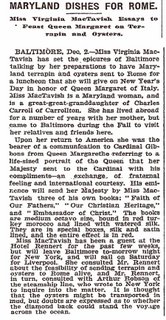




 Source: The New York Times, April 19, 1890, p. 5.
Source: The New York Times, April 19, 1890, p. 5.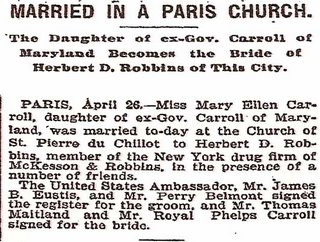 It shows how large a percentage of the family was living in Paris that the wedding was held in that city. Source: The New York Times, April 27, 1897, p. 7.
It shows how large a percentage of the family was living in Paris that the wedding was held in that city. Source: The New York Times, April 27, 1897, p. 7.
